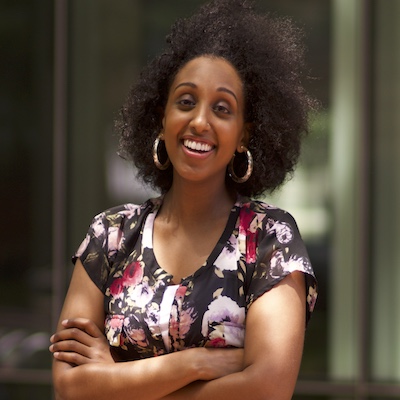Inspired by a fellowship abroad, Betty Mesfin uses the Align program to help her accomplish her goal to impact the lives of others
Author: Sarah Olender
Date: 06.30.21
“My family is originally from Ethiopia, so I identify as an Ethiopian American woman,” Mesfin said. “I took a trip [to Ethiopia] and after coming back, I just couldn’t stop thinking about wanting to be there.”
 Betty Mesfin
Betty Mesfin
After doing some research, Mesfin found the Ethiopian Diaspora Fellowship, which opened up another opportunity for her to return to Addis Ababa.
For six months, the fellowship helps participants experience the culture of living and working in Ethiopia, but also helps them to gain a sense of cultural identity. Mesfin explained, “You actually [collaborate] with a partner organization for six months and you live, eat, [and] work in Addis Ababa… So that was my first real opportunity or really just, I think, the springboard for what was [going to] happen next.”
After working in a variety of different career fields during her fellowship, such as in health care and agriculture, Mesfin realized that there was a lot of technology that was available in the U.S., and she was inspired to bring that technology back to Ethiopia in order to further the tremendous growth that has been happening.
“You saw how [technology] impacted everyone’s daily lives,” Mesfin explained. “A lot of times when we think of change, and we think of impact, we think of it on such [a] grandiose level, but we forget that there are problems we can solve that will affect how people navigate their day at even the lowest level.”
She realized that how she interacted with others and conducted her career could make a difference. After seeing the technological developments in different industries in Ethiopia, and how much of an impact technology could have, Mesfin knew she needed to find a program that would give her a solid foundation to help others in the future.
Before she went to Ethiopia, Mesfin studied marketing at Binghamton University. After graduation, she found herself falling into a more corporate, finance-related career path. She enjoyed business, and during her experience abroad, she looked at the different jobs she was working at through a business lens, which led her to think about how a variety of industries could improve with better technology.
“I need a bulkier foundation, I need more of a skill set than what I have right now if I’m going to actually make some type of impact,” Mesfin thought to herself. She explained, “That was kind of the last thing I needed to say, ‘Okay, well, technology will not only help people’s daily lives but also help businesses make informed decisions.’”
Upon her return to the U.S., Mesfin started exploring her options. She knew she wanted to get a computer science degree but didn’t know what that was going to entail. At first she thought that she might have to get a second bachelor’s degree or take a computer science boot camp to get her up to speed.
It was a stroke of luck that she stumbled upon the Align program through her internet searches on computer science programs.
“There aren’t a lot of programs like Align,” Mesfin said, elaborating, “for somebody who has a non-traditional background.”
“‘Whoa, this program fits exactly with what I’m looking for,’” she recounted. Mesfin applied and got in. “Thankfully, I got in and that’s what brought me here.”
In addition to being an Align student, Mesfin has found her home on campus in clubs and activities. She is an advocate for social justice and equality, especially in the field of computer science, and she shows this through her community activism. She is the founder and the former co-president of Code4TheCulture, a club with a mission to create an inclusive and supportive community for Black and Latinx graduate students within the computer science community, according to the Northeastern clubs and engage page.
She founded the club last year with Xavier Husser, Jessica Gonzalez, Joviane Bellegarde, Sandra Kwawu, and Isabella Perez. This group recognized the need for a more inclusive space in the computer science community, so they formed the club to create a welcome club that focuses on promoting diversity in the field.
In her next project, Mesfin is creating a podcast called “We The Queens.” She plans to use the knowledge and leadership skills she gained with Code4TheCulture to lead conversations about celebrating Black women and with the intention to “serve as a springboard, where communities can be fostered and the sisterhood will be reclaimed,” Mesfin wrote.
The podcast will feature a diverse range of stories and conversations with Black women, with the intent that they will help showcase to the world how Black women are “rich in complexity and multifaceted in talent, ingenuity, and creativity.”
Expecting to graduate either in the fall of 2022 or spring of 2023, Mesfin hopes to use the knowledge she acquires with her master’s degree through the Align program to help build tools that will make technology more accessible. She wants to build products that will improve people’s day-to-day lives and inspire them to be successful.
“I’d really love to build products that will, across the board, improve the lives of everyone, regardless of race, class, creed,” Mesfin said. “If done correctly, technology has the ability to do that.”
Subscribe to the Khoury College newsletter
The Khoury Network: Be in the know
Subscribe now to our monthly newsletter for the latest stories and achievements of our students and faculty